#both have stories written by neil gaiman
Text
My two current obsessions stopped fighting in my head and started to make out with each other instead.
Now I want Dagon and Poison Ivy to become besties and save the ocean together. Violently.
#a fish demon and a plant lady saving the environment#sinking large fisherboats#dumping greedy ceos in toxic waste#stuff like that#I'm sure they would get along just fine#it's moments like this I wish I knew how to draw#both have stories written by neil gaiman#so it's not totally random#good omens dagon#poison ivy#streaming right out of my brain
9 notes
·
View notes
Text
Can nobody see nuance on this site? Yes, Neil Gaiman is a famous author who has, surprise surprise, just been accused of horrible and awful things. “Burn his books” “if you watch good omens you support genocide”. The world is not black and white. Let’s look at the facts:
Neil Gaiman is very rich, very famous, and a very cishet guy
Neil Gaiman is very vocal about his support of transgender people
Neil Gaiman fingered his son’s 22-year-old Nanny when he was 61, when they were in a legal sexual relationship
The journalist who broke the news is a transphobic radfem and the sister of Boris Johnson
The podcast discussing this story with the is very anti-BDSM (something very much present in the relationship between Neil and the first victim)
Texts and emails between Neil and Scarlet (one of the women) were expressions of mutual sexual desire/enjoyment
The two women said they were both in their twenties when the respective sexual relationships began, with Neil several decades their senior (61 with Scarlet and mid-forties with K)
The victims have accused Neil Gaiman of raping them via digital penetration and have shared very similar stories
You are not a horrible person for still liking Neil Gaiman media. Stop telling people to burn their copy of good omens. Stop telling people that reading the Sandman means they support genocide. Stop turning this into a chance to spread antizionism. Stop trying to get David and Michael to speak on this. You don’t know anything except what has been written. You do not have the moral high ground.
Take a deep breath and get off of tumblr.
Go touch grass.
(edited because of wording)
(please see my other post where I reblogged with more info)
2K notes
·
View notes
Text
Ok, look, I'm gonna say one thing about this then remove myself from Tumblr for a few days because I can't watch the cancel culture bs happening.
Neil Gaiman has always been a staunch supporter of trans rights.
The journalist who broke this story has written articles supporting JK Rowling's transphobic beliefs.
Radfems and terfs LOVE to pretend that trans people and people who support trans rights are paedophiles or abusers.
The only major newspapers I have seen cover this are the Daily Mail and the Telegraph, both of whom I have seen be transphobic in the past. I don't know for sure, but I'm guessing other papers and new outlets are trying to you know, verify their sources before they run a story.
This is breaking the day before the UK General Election, in which trans rights has been a major debate.
We don't have all the facts. I haven't seen a news source I would even vaguely trust cover this story.
Take a deep breath. Think about who is giving you this story, and what they might have to gain. Don't jump to conclusions. Wait for developments.
#neil gaiman#trans rights#rachel johnson#jfc#i can't sit and watch peiple jump to conclusions with no evidence#bye tumblr for the next week or two i guess
2K notes
·
View notes
Note
hello, mr neil gaiman. i have encountered good omens in my local bookstore here in the philippines (which is rare bcz most bookstores here are only available in the city).
unfortunately, i didn't have enough money to buy it (crying), so i took a picture of it instead. hoping and praying that i can buy the best slow-burn book that has ever been written (thank you for this story).

I love that both covers are in the Philippines.
2K notes
·
View notes
Text
The Final Fifteen is about Terry Pratchett's Death
read on Ao3
The final fifteen is obviously a major plot point, and serves a role in a story that was written long before Terry Pratchett was ever diagnosed with Alzheimer’s. But the scene itself wasn’t written until just a few years ago, during the writing of Season 2. In fact, the scene came about during a park bench conversation between Neil Gaiman and John Finnemore.
Others have noted that the non-romantic kiss that signals the story moving into the third act is a Neil Gaiman staple. The function of such a kiss, from Gaiman’s perspective, is to communicate.
In 2023 we are seeing a lot of stories written by men, for men, about men who are best friends and discover that their friendship can go deeper than the norms of society would usually allow; that platonic and romantic love are not so far apart, and perhaps the better word for a relationship that can be described this way is intimacy.
Neil Gaiman has made it clear in interviews that his friendship with Terry Pratchett was deeply intimate. They began collaborating on what would become Good Omens in the 1980’s, endured a tumultuous experience together through the first publication, wherein Neil offered to martyr himself on behalf of Terry if the book failed, and then spent the better part of two decades touring the world, meeting the people who loved their work. Neil would even off-handedly remark that Terry’s fans were so cheerful, and Neil’s seemed like they were ready to kill themselves; wouldn’t it be nice if they got married? From the outside, it looks very much as if Terry was Aziraphale-coded, and Neil was Crowley-coded, working together in an unexpected partnership to make the world a little bit more tolerable for the humans inhabiting it. I am not conjecturing that Neil and Terry had romantic inclinations the way their fictional characters do, but I think it is fair to say that their opposites-attract intimacy became an important part of who each of them were.
In 2007 Terry Pratchett was diagnosed with posterior cortical atrophy, a rare form of Alzheimer’s. As the disease progressed, he began to lose himself, and knew that the person he used to be was slipping away. He wanted to end his life on his own terms, and die as himself, but England did not and still does not allow for voluntary euthanasia or assisted suicide. He advocated for the right to die but never achieved it, and ultimately succumbed to the disease in 2015. Neil Gaiman has spoken a lot on the topic of death, and one answer of his that resonated with me reads:
Mostly it feels terrible. It even feels terrible when it’s someone who has been in a lot of pain for a long time or has not really been there for a long time and you know that Death has in some ways been a blessing: suddenly you are mourning the whole person.
It doesn’t get easier as you age. It gets stranger. The point where you realise how many people you used to know and like who aren’t there any longer, and you cannot talk to them or see them or laugh with them is painful in a way that I had never expected. The first time that someone you had a romantic relationship with dies and you realise that there had been moments both of you shared and now you are the sole custodian of those moments and one day you will be gone and they will be lost forever is peculiarly strange and hard.
~~~
The entire show is seeded with references to Terry Pratchett, but the most important one is the one that’s missing. Neil Gaiman cameoed as a sleeping moviegoer in S1E4, but a long time ago, he and Terry had discussed cameoing as sushi restaurant-goers, because sushi was weirdly prominent in the book. That cameo would have been in S1E1. But when it came time to do it, Neil couldn’t. Not without Terry.
Neil: I was gonna say our location is a Chinese restaurant we’d had turned into a sushi restaurant. So Terry and I, Terry Pratchett and I, had a standing… not even a standing joke, just a standing plan, that we were going to have sushi - there was going to be a scene in Good Omens where sushi was eaten and we were gonna be extras, we were gonna sit in the background, eating sushi while it was done. And I was so looking forward to this and, so I wrote this scene with it being sushi, even though Terry was gone, with that in mind and I thought: Oh, I’ll sit and I’ll eat lots of sushi as an extra, this will be my scene as an extra, I’ll just be in the background. And then, on the day, or a couple of days before, I realized that I couldn’t do it.
Douglas: You never told me this before either. I might have pushed you into doing it, had I known. I think you were right not to tell me.
Neil: I was keeping it to me self ‘cause I was always like: Oh, maybe I’ll be… this will be my cameo. And then I couldn’t. I was just so sad, ‘cause Terry wasn’t there. And it was probably the day that I missed Terry the most of all of the filming - it was just this one scene ‘cause it was written for Terry and all of the sushi meals we’d ever had and all of the strange way that sushi ran through Good Omens.
~~~
In the Final Fifteen, it is clear that Crowley and Aziraphale want to stay together. They love each other. They each know that the other loves them. There’s nothing that needs to be said, no convincing that their bond is true and real and precious.
But Aziraphale has to go to Heaven, and Crowley cannot follow him there.
I cannot speculate what it must have been like for Neil to endure losing a friend who, though I’m sure he desperately wanted to still be in his life, he also knew that life had become a burden to him, and grieved that Terry was not able to choose the time and manner of his departure from this Earth. This sort of complex grief, we fan-ficcers know, is the kind that is often best processed through story-telling.
I think that what we see Crowley going through in the Final Fifteen, alongside its importance to the story arc of Good Omens overall, is Neil processing his grief at losing his friend Terry Pratchett, and even the kiss, that violent, terrible, awful kiss, was the symbolic representation of Neil saying goodbye.
#neil gaiman#terry pratchett#aziraphale#crowley#good omens#good omens 2#good omens meta#ivoc#this meta ended up being only about 2/3 the length of my usual metas and somehow that feels appropriate because Terry's life ended too soon#and the jarring brevity of this piece parallels that feeling of sudden unexpected loss#for me anyways I don't know about you guys#if this made your eyes even slightly moist you are obligated to reblog to help someone else feel their feels#I don’t make the rules#but them is the rules#blessed by Beelzebub
885 notes
·
View notes
Text
INEFFABLE META MASTERPOST
Because I'm slowly losing count and need to organize. So, here's all my self-written metas or ones that I reblogged with my own added theories and commentary! In rainbow colours, naturally.
1 – Aziraphale, I love you. But you lied. And here's why.
My most lengthy and proudest meta about the Final Fifteen and why I think Aziraphale lied on purpose. (Also: The absolute darling @esthermitchell-author bravely fought their way through it and wrote up some more interesting points and different takes on what I came up with. If you want to go down a S2 rabbit hole with us, go read it here.)
2 – Why Aziraphale is an unreliable narrator (links below)
A three-part meta in which I try to analyse and explain that all of the minisodes in Season 2 are not objective narrations but actually Aziraphale's memories.
Part 1: The Story of Job
Part 2: The Story of wee Morag
Part 3: The Story of the Magic Show in 1941
3 – The Jane Austen Ball and why it was never about Nina and Maggie
A meta in which I go into unnecessarily great detail about how the Whickber Street Meeting Cotillion Ball was meant to be Aziraphale's confession to Crowley.
4 – Crowley & Aziraphale were never free (reblog)
A reblog of @baggvinshield's post in which I explain why miscommunication is the single biggest ineffable enemy in Season 2.
5 – In Defense of Aziraphale (double reblog)
A double try at explaining why I think Aziraphale's POV in the Final Fifteen is just as horrible as Crowley's and why I don't think him "choosing" to go back to Heaven was the only point of his character journey.
6 – The Art of Miscommunication: Ineffable Edition
A meta in which i once again explain why miscommunication is the single biggest ineffable enemy in Season 2.
7– Season 2 Bookshop Shot Meta
A meta where I briefly loose my mind because of a single bookshop frame in Season 2.
8 – What if it wasn't Aziraphale and Crowley who performed the 25 Lazarii miracle?
A mini-meta in which I propose the theory that Jimbriel helped with the miracle to hide himself away from Heaven & Hell.
9 – Things in Good Omens Season 2 I still find weird (reblog)
A reblog of @ok-sims and many other great OPs' thoughts on the weird loose strings in Season 2 and what unanswered questions I still have myself.
10 – The Deleted Bookshop Scene (reblog)
A reblog of @skirtdyke's video and @i-only-ever-asked-questions' smart thoughts on it, with my own overly-excited 'what that could have meant for the "It's too late" line'-theroy.
11 – The Bentley Handle Easter Egg
A meta I can proudly say has been liked by none other than Mr. Neil Gaiman himself about Crowley's Bentley handle that might have existed before the Bentley ever did.
12 – The F*cking Eccles Cakes
A meta where I briefly loose my mind because of a pastry. (Addendum: People said very smart things in the comments of the post!)
14 – Re: "You go too fast for me, Crowley"
A meta in which I make myself sad by connecting that infamous line to Aziraphale assuming Crowley wanted the Holy Water as a suicide pill.
13 – Trauma-Dumping on your plants: The Anthony J. Crowley Chronicles
A meta on why Crowley treats his plants the way that he does.
14 – Demonic Mental Health Awareness Post
In which I talk about why I want to get Crowley a therapy voucher.
15 – The Curious Incident of The Flaming Sword in Good Omens
A meta on why the Flaming Sword has no deeper meaning. Or does it? (Updated: here's a reblog from @queerfables who did a wonderfully exellent job at calmly explaining all the swordy questions I was yelling about! Consider this meta solved.)
16 – Ceci n'est pas une plume
A meta in which I'm a bit of a nerd for language and also explain why learning French and magic the human way says so much about Aziraphale as a character.
17 – The meaning of "I forgive you"
A meta in which I explain what both "I forgive you"s mean and why Aziraphale will always fight for what is right until he wins. Also, the lovely @sharksbeerr translated it to Chinese on Weibo!
18 – Memory, or the lack thereof, in Season 2
A little reblog on how memory is a big and unresolved, leaky-bucket theme in Season 2.
19 – „It‘s always too late.“ (ft. Crowley‘s watch)
A short meta about that lines from Season 2 that won‘t leave my brain (and also Crowley‘s mysterious watch).
Addendum:
The one non-spoiler-y ask I could come up with about S2 that was actually answered by Neil, yay!
Also, this wholesome little post I added to that Mr. Gaiman also reblogged. :‘)
*** This is a work in progress and will get updated every time I post a new meta! ***
#good omens#good omens season 2#crowley#aziraphale#ineffable husbands#gos2#go2#good omens 2#good omens meta#good omens s2#my own meta#good omens season 1#meta masterpost#ineffable-suffering
522 notes
·
View notes
Note
Hello and good morning/day/night :]
I was wondering, in BNF, we’ve gotten tiny little bits of information about the ‘Nice and Accurate Prophecies’ (not sure if that’s the correct title, sorry) book and TV series, if there was anything else you could tell us about it?
Character names, storylines, plots, any fun details you may have made up or otherwise, etc, etc.
I just think it’s sweet how interested both Aziraphale and Crowley are in the series, and if you might be as interested, if not more, in it too.
Thank you, and have a lovely Sunday. 🫶
this is it, my leash has snapped, i'm wild in the streets, thank u for asking; i'm gonna go be insufferable now
(hi @neil-gaiman if you see this, i think it's safe to read, but it does border on being fan fic. i'm writing a fic where crowley and aziraphale are an artist + writer in an online fandom, much like we are for good omens, and this is the fake story i've made for them to be fans of 💛)
The Nice and Accurate Prophecy
info dump of the fake 5 book series by Agnes Nutter (1985-1992) and its fake fandom:
The Nice and Accurate Prophecy
The Strange and Improbable Prophecy
The Vague and Perfidious Prophecy
The Tense and Harrowing Prophecy
The Faint and Ineffable Prophecy
a dramatic, layered story with a bizarre and unexpectedly lovable cast of characters, humour that hits you out of nowhere, and a lot of attitude from the narrator. a la Good Omens, A Series of Unfortunate Events, Hitchhikers Guide to the Galaxy
fantasy/historical fantasy and mildly action & romance
a la good omens, a witch and a witchfinder become friends and help each other throughout history, despite being on opposite sides. they get closer as they fight against the immoral plays from their prospective sides (the witchfinder army and a demonic cult the witch was born into) that each lose sight of their core values in a bid to hold more power over the world.
the story is set primarily in a medieval fantasy era, but suddenly jumps to the present in the later books, catching everyone off guard and giving a whole new context to enjoy the story. the challenges they face parallel the earlier story but in a modern take with modern technological twists. the modern era is the late 80s, since that's when it was written.
the witch reincarnates, similar to doctor who, due to a high class black magic ritual they performed in their arrogant youth (which they were NOT supposed to have access to). they've had long lifetimes where they die of old age, and others where they've barely managed to live a year. their reincarnations aren't entirely random; they will reincarnate according to their growth and preferences as a person (a la Magical Boy's magical outfit generations), which includes fluctuation in gender identity. their pronouns fluctuate depending on each "face" they wear, but have canonically been a "they" before. the good side of the fandom (crowley & aziraphale) default to they/them as an overall rule. they do have a name, but they like to change that too, so the fandom almost exclusively calls them witch, or witchy.
the witchfinder also has a name, but the fandom have taken to calling him witchfinder to match the fact that witchy is called by their role. it also helps that a lot of the witchfinder narration refers to him by role instead of name. he is human, 30ish in appearance, but at the end of the first book, the witch fears to lose him and curses him with immortality against his knowledge to try and keep him safe.
witch is crowley-coded, witchfinder is aziraphale-coded. my to-do list includes an illustration of the two of them played by michael and david :') but i picture them being kind of like newt and anathema for the most part.
ship names include witch/finder, witchwitch, w² or witch², and witchfound.
at the start of the first book, they meet and become friends without knowing each other is a witch & finder. the witchfinder is a bit bumbly, like newt, and the witch is cool and suave but neurotic and insecure like many human au variations of crowley (major overcompensation vibes). witch is male at the start of the first book. their friendship is secure when witch finds out he's a witchfinder, so there's less "oh my god i'm friends with the enemy, is he going to kill me in my sleep?" and more "ah fuck, Lets Drink About This"
there's battles, horseback riding, camping out in dark woods, disappearing and losing each other for months at a time, and many missed connections as they try to work together against two common enemies, whilst keeping up the facade that they're on their respective team's sides.
there's charged chemistry in the first book, but it's more plot heavy. there's hints of shippy moments in the 2nd book that fall in between the plot. there's a Moment of almost confession in the 3rd book, and a non romantic kiss towards the end (we gotta, for neil). they're pretty much married in the 4th book, securely at each other's side, but never actually talk about it until the end, and there's a more explicitly stated shippy connection in the 5th book.
agnes herself is a total recluse who drops books out of nowhere then goes back to existing somewhere in the english countryside (people presume). she's happy to supply signed copies to fundraisers and conventions, and sometimes random bookshops across the country will be vandalised with genuine autographs on the inside covers. she's notoriously pedantic about being involved with adaptions behind the scenes, but she has no social media and isn't ~around~. she once did a talk when she was presented with an honorary doctorate, and did a single book signing when the first Prophecy book came out, but beyond that she keeps to herself.
there are a small handful of quotes from her in behind-the-scenes footage talking vaguely about character intensions and clarifying world building, but she likes to leave things up to interpretation like neil does. it's in these few snippets of interaction we've seen from her that she's steadfastly supportive of intersectionality and lgbt rights, like staring dead-eyed at an interviewer when they ask her a ridiculously heteronormative question about the characters (like "have you read my books?")
adaptions include:
(most adaptions start like the book, with a male witch at the beginning that turns into a female witch when they first regenerate. the early ones usually change the pacing by switching to a female actor by the time they realise witchfinder is a witchfinder, unlike in the book where he's male for this scene, and there's way less Charged™ chemistry between the m/m witch/finder.)
Feature Film: late 90s, kind of cheesy, but good spirited fantasy (a la Indiana Jones). focuses on the first book alone, with hints to a sequel that never happened.
Abandoned TV Pilot: early 2000s, a little too dramatic but still a good time (a la the Dungeons and Dragons 2000, ASOUE 2004). good source of gifs and Moments™ but the fandom is generally Fine with it being abandoned.
Stage Performance: late 2000s-early 2010s, a stellar stage adaption of the first book with elements of the 90s movie. f/m witch/finder the whole way through. one cast used m/m actors but it was a short run and only a handful of fans were lucky enough to catch or remember it. crowley would give his left arm (or someone's, anyway) to have experienced it, so a fan sent him some flip phone camera footage of it that he keeps on a harddrive in his safe.
HBO Streaming Series: late 2010s-present, high quality, highly revered, resurged the fandom's popularity and spread the series further overseas. made in america, but doesn't try to americanise the series. extremely respectful to the books, with easter eggs to the film, and is working its way through the entire book series (a la The Witcher netflix series). f/m witch/finder, but has had one episode that included some flash backs/montages of different witch faces. probably like 15 minutes total screentime of a male witch played by a ncuti gatwa level/style of actor, which the fandom has giffed, edited, and screencapped to oblivion.
Several bonus books: Agnes has written a few extra books (a la The Unauthorized Autobiography of Lemony Snicket and The Beatrice Letters), as well as curated some anthologies from other authors (a la A Study In Sherlock). there are a total of 3 anthologies so far, in which other authors have written stories about the characters in their own tellings. basically like canonised, published fan fiction, curated and authorised by agnes herself. There's also an unfinished graphic novel that retells the book series (a la The Adventure Zone comic), but has been WIP/unheard of since the 3rd book.
292 notes
·
View notes
Text
The Secret Language of a Page of Chivalry: The Pre-Raphaelite Connection
Adapting Neil Gaiman’s Chivalry is a decades-long dream fulfilled. The story as text can be enjoyed on multiple levels, and so can the art. You look at the pages and see the pretty pictures, but the pictures also have meta-textual meaning. Knowing this secret language adds to the experience.
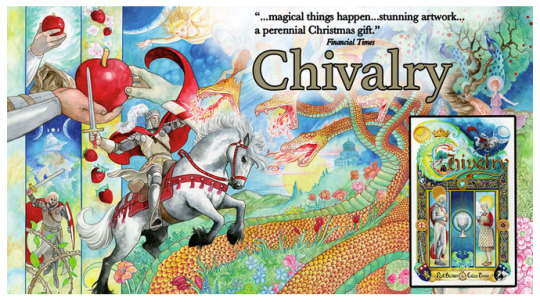
Some people pick up the references quickly, but I’ll share with you some more of what’s going on under the surface.
In Ye Olden Days of Art Making, most painters made pictures that contained visual narrative cues. Flowers in a picture might be heraldic signs that signaled political affiliations, or could indicate purity, anger, or love. Purple was the color of kings. A dog in a picture might represent faithfulness, and butterflies could represent the soul.
There are Pre-Raphaelite paintings with so many symbols and ideas in them that you need a deep working knowledge of Victorian and Edwardian social mores to understand what’s going on.
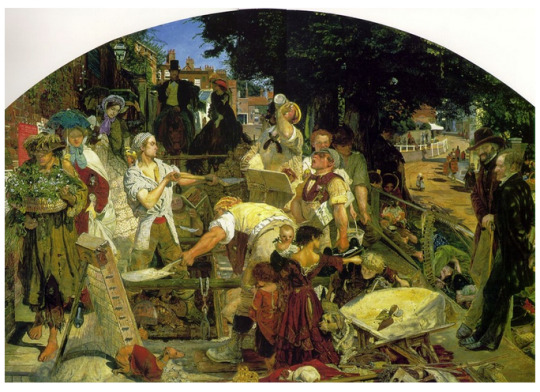
For example, Ford Madox Brown’s Work, a painting which took some 13 years to complete, was first exhibited in 1865 with a catalogue explaining all its symbols and elements. There is nothing in that picture that doesn’t mean something.
I brought some of that visual meta-textual sensibility to Chivalry, (and I’ve written about the symbolism and meanings in the work in other essays.)
I also brought into the work direct Pre-Raphaelite art references.

From 1868-1870, Sir Edward Coley Burne-Jones created four paintings illuminating the tale of Pygmalion and Galatea, entitled Pygmalion and the Image, and wrote a poem with each line titling one painting:
The heart desires
The hand refrains
The godhead fires
The soul attains.
A perfect little poem for Chivalry, and I think of it often when some people present me with what I think is a very strange question: why didn’t Galaad just take the Holy Grail from Mrs. Whitaker?
It kind of breaks my heart that people would even ask that.
Burne-Jones painted two versions of this series of which this is the second.

In the first panel of this page, Sir Galaad kneeling before the Grail is derived from the figure of Pygmalion kneeling before Galatea: The Soul Attains.
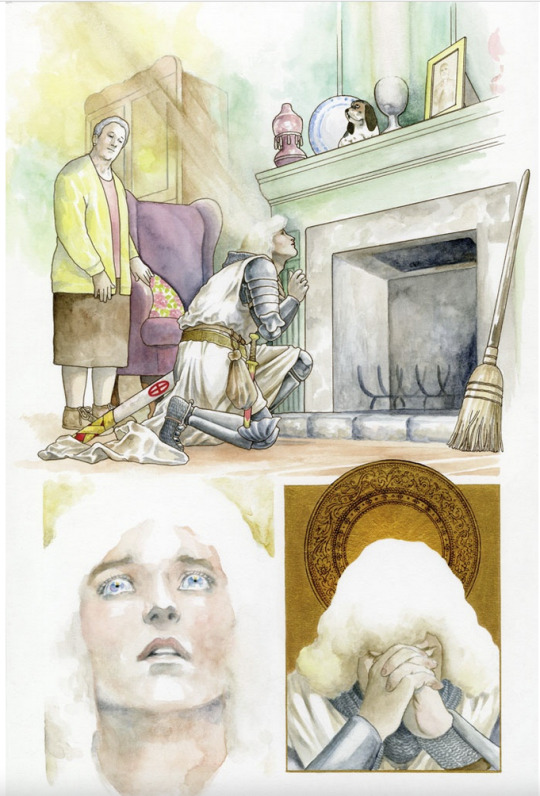
Sir Galaad’s restraint even in the face of his greatest desire makes him worthy of his prize.
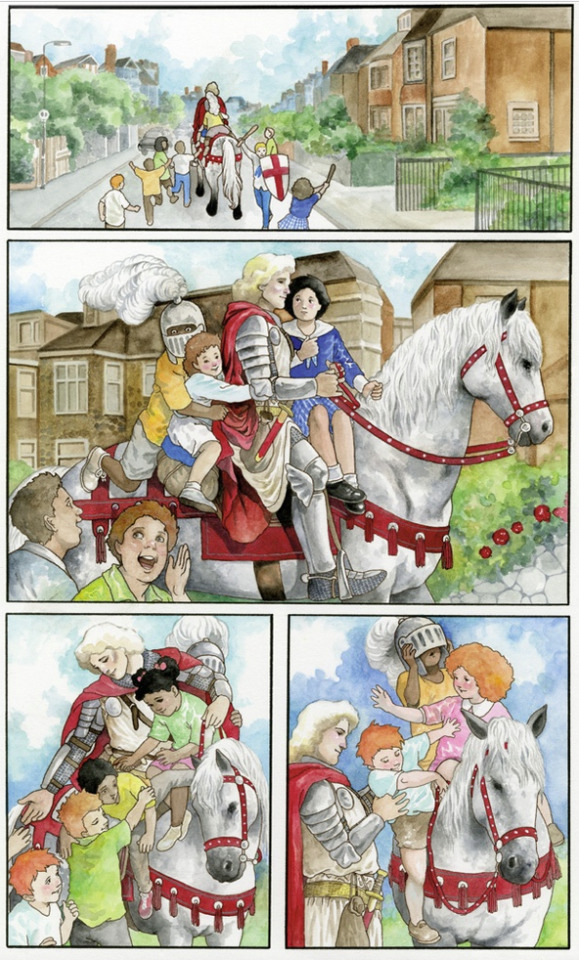
There are two Pre-Raphalite references in this page, the most obvious being in panel 2: it’s Sir John Everett Millais’s 1857 work A Dream of the Past: Sir Isumbras at the Ford.

The painting was very poorly received on first exhibition, compelling Millais to redo significant portions of it. It was caricatured and ridiculed, and then ended up becoming influential and popular, and isn’t that the way it goes.
That’s an art career in a nutshell, really.
The Sir Isumbras image also influenced John Tenniel’s illustrations for the Lewis Carroll Alice in Wonderland novels.
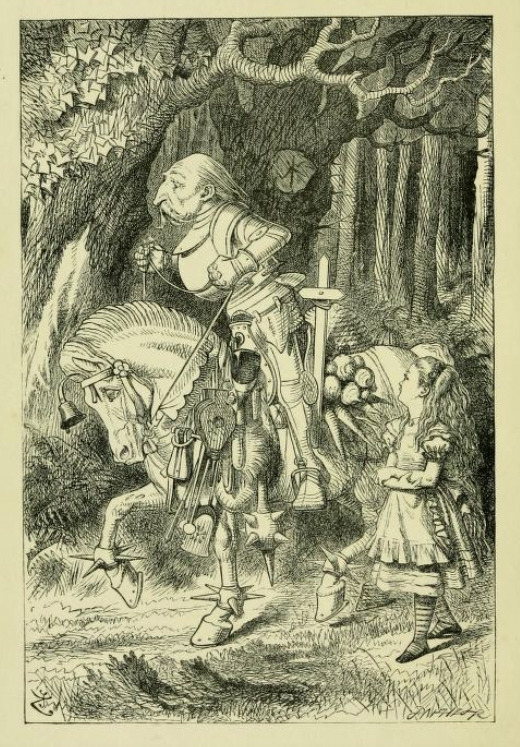
Sir Isumbras derives from a 13th century Medieval romance poem about a good knight whose pride causes him to fail in his Christian duty. He is presented with a series of difficult challenges before he can find happiness again, reunite with his family, and be forgiven his sins. The painting by Millais is based less explicitly on the poem than it is on a later parody of the poem. (It’s complicated.)
My using Sir Isumbras as the base for the shot of Galaad with the children is obvious here. In the Millais painting, Sir Isumbras carries a woodcutter’s children across the ford. In Chivalry, Sir Galaad carries the children of Mrs. Whitaker’s neighborhood down the street.
While Sir Isumbras spent many years learning humility and Christian duty, Galaad has a long quest to fulfill before he can achieve his goal. And on the way to that goal, he’s humble and nice to children, too.
That the Millais painting was such a huge influence on many a depiction of knighthood over the years made it a perfect reference point here, and the story behind both the painting and the poem give it further layers of meaning.
The next panel has a far less obvious reference, but the source is Arthur Hughes’s painting The Rescue.
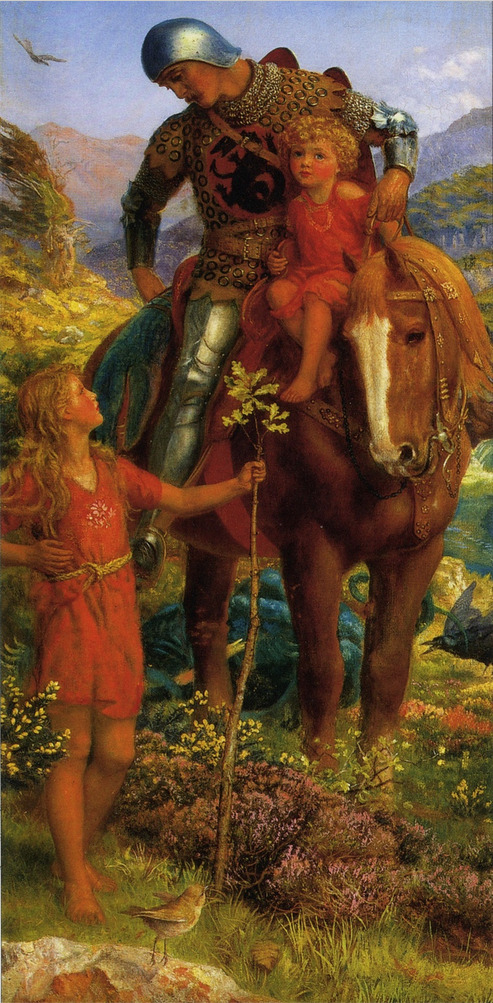
Arthur Hughes is one of the lesser-known Pre-Raphaelites, but his art is widely seen and influential. He’s certainly been a big influence on me, as many of his paintings appear again and again in Arthuriana references, as he was a prolific King Arthur picture tale teller.
The Rescue (1907-1908) was originally part of a diptych which was separated and sold back in the 1920’s. His style was becoming unpopular by the time Hughes painted the work, and little is known about this work except that one panel was in the collection of Andrew Lloyd Webber at some point. Maybe still is. Dunno.

Anyway, the diptych depicts a little child kneeling in prayer menaced by a dragon in one panel, and in the next, safely trotting away with a knight on horseback. I like that this is a diptych, a kind of proto-comic art form common in medieval religious art, so this was perfect to use here.
Another reference to Arthur Hughes is in this double page splash from later in the book as Galaad on his quest encounters the Hesperides.
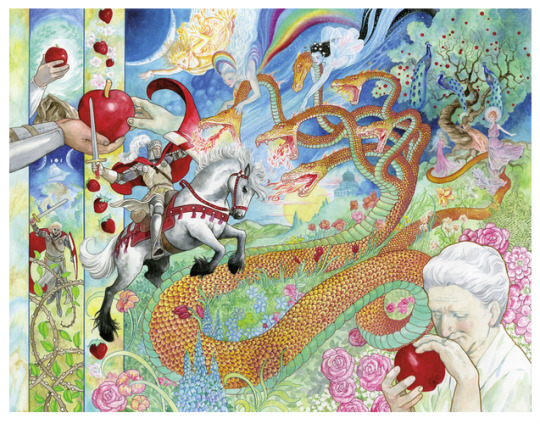
I didn’t set out to reference this Arthur Hughes piece at first, but it’s one of my favorite paintings. When I realized my sketches for this scene kept echoing the Hughes composition, I went with it. The Hughes painting of Galahad is one of the most famous depictions of the character, so it makes me happy to have this referenced in Chivalry.

Kindly ask for CHIVALRY, published by Dark Horse Comics in the USA and by Headline Books in the UK at your local comic shops or bookstore. Written by Neil Gaiman. Adaptation and art by me.
For further reading on this project, go HERE.
HERE.
And HERE.
Thank you to my Patreon patrons for sponsoring my work and this post.
Colleen Doran Illustrates Neil Gaiman will be a solo exhibit at the Society of Illustrators in New York City this spring. Watch this space for updates.
Have a wonderful holiday season.
#neil gaiman#dark horse comics#king arthur#Sir Galahad#Comics#graphic novel#fantasy graphic novel#watercolor#pre raphaelite#pre raphaelism
2K notes
·
View notes
Text
Okay inspired by this post by @irispurpurea and this post by @ouidamforeman (both of which are excellent, please read) I wanted to add some thoughts about the structural weirdness of season 2.
The reason season 2 feels so structurally WEIRD is that it's the second beat what is now a three act story, but that wasn't written as one in the first place.
Season 1 was a complete, self-contained story arc with completed character development, based on a complete, self-contained novel. The story of Good Omens is about an angel and a demon going from opposite sides to their own side, aligned with earth and its humans. And at the end of season one this story has been told! It's done!
If you want to keep the story going, then, you have two options -- either you find a completely new story to tell with these characters, or you do what Neil Gaiman et al have chosen to do and you complicate and unresolve the conclusion from the first story in order to tell the same story but in an even bigger and more nuanced way.
The challenge of season two, then, is to reframe the events of season one not as a completed story but as the first act of a three-act arc.
And genuinely I think this is just not the way that most TV shows tasked with writing their second season go about doing it. Not that this is a bad choice! But the reason it feels weird on first glance is because it's taking its structure from like... half of the sequel to a novel, not a TV show that gets a second season.
This is the point of all of the historical flashbacks in season 2-- to make us understand that Crowley and Aziraphale are not on the same page and haven't been for 6000 years, despite appearing to be by the end of the first season.
The other thing I think season 2 does is make the whole story about Crowley and Aziraphale's relationship in a way it just wasn't in season 1. Taken on its own, season one's A-plot is the apocalypse, and the B-plot is relationship between this angel and demon.
What season two does then is literally FLIP the importance of those two things structurally. Season one's apocalypse and various side characters now occupy the same place as the Gabriel mystery in season 2. Which is also why it feels so weird to be like "wait this thing that felt like The Big Important Thing before is now suddenly the background of something else."
All this to say, this season is SO structurally interesting because it's just straight up not like other TV shows in structure, and because of the way everything now has to be marketed and framed in trailers as one, more typical kind of story, AND because the first season was a complete story that has now been reframed as an incomplete story, Good Omens season two feels very weird but imo much less weird upon rewatching, and will again feel less weird once we have season 3 and the story gets to complete its arc.
#good omens meta#good omens#good omens analysis#good omens s2#anyway I have been THINKING THOUGHTS lately lmao#and the state of television right now is so fucked but also so interesting to me#if they told the exact same story but as a 12-episode second series instead of two 6-episode series#I think people would feel completely different about it -- myself included!#is Good Omens perfect? no. Do I love it with my whole heart forever? absofuckinglutely#my good omens meta#sitzfleischh.meta
475 notes
·
View notes
Text
My mom and I were finally able to watch the final episode of Good Omens season 2.
Before we dive in, my mom is very — how do I say this — anti on certain things. My friend said it perfectly. He said she gave him the homophobic put the fear of God type vibes when he first met her.
I don’t believe anything will ever fully change her opinions or views of us. I’ve not even referred to myself as aromantic / asexual in her presence, and I doubt I ever will. I simply tell her I’m done dating. It’s clearly not in my future, and, after trying it a couple of times, it just isn’t something I’m interested in.
I hope that one day she will open her eyes and realize that it’s all fine. Whatever we are. It’s okay.

My mom enjoyed season one. When I asked her what she thought of Aziraphale and Crowley, here’s what she said. Not her exact words but close enough to what I can remember.
“Aziraphale seems like he’s afraid of getting into trouble with Heaven, but not enough to keep him from going against God’s orders.”
Just enough of a bastard to be worth knowing.
“Crowley isn’t as evil as he paints himself to be.”
Just a little bit a good person.
The only thing, as far as I’m aware, that didn’t quite sit right with my mom is that God is a She.
Wibbly wobbly timey wimey…

I was terrified for her to watch the second season because of Maggie and Nina and That Big Damn Kiss. She’s told me some less than desirable things previously. Here are a handful of them.
“I won’t watch shows that have gay couples in them.”
“I will watch them, but I’ll just turn my head away when they kiss.”
About my friend who is a lesbian —
“Your friend just says that, but she doesn’t actually know what she is.”
Okay, mom. You go ahead and keep telling yourself that.
I am certain, despite my fear, that I wanted her to watch Good Omens so badly because I thought maybe it would be the golden ticket. It’s uniquely different.
We have been gifted with Anthony J’I’m Not Actually Either Crowley and Mister AZ Smitten I Believe Fell, The Almighty God She, Nina I’m Not Your Type and Maggie You Have No Idea.
I was expecting my mom to frown upon Maggie and Nina’s story in season two, but she didn’t. She actually didn’t even have anything negative to say.
Y’all should have seen me when That Big Damn Kiss was coming up. I was fidgeting probably as bad as Aziraphale was when he was gathering up the courage to ask Crowley to dance with him.
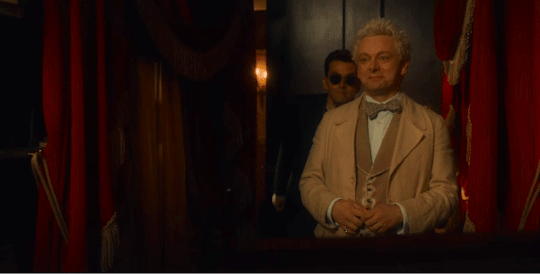
I don’t think I’ve ever fidgeted that much in my life.
And then it happened.
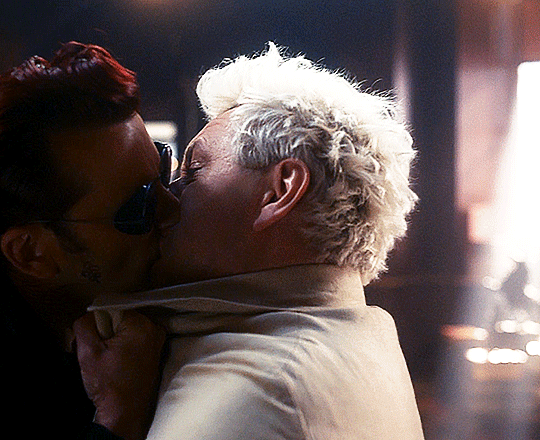
That Big Damn Kiss
And she watched all of it. She didn’t look away. She didn’t make a face. She didn’t say anything negative.
I don’t necessarily think her views have changed because she laughed at something my uncle told her about a former coworker of his. This coworker used to go by Craig, but he later came out as trans and asked to be called Cindy. My uncle said, “The best we can do is Crindy.”
Most of my family are homophobic, and I don’t care for it.
I don’t know if it’s the way Neil Gaiman has written Good Omens, but I was surprised that she watched the entire show, had nothing negative to say and even added that she needs to watch all of both seasons again to better understand it.
That’s something, I suppose.
Maybe she’s coming around.
Thank you, Neil Gaiman.
You truly are a legend. 💚
#the ghost speaks#good omens#crowley#aziraphale#david tennant#michael sheen#maggie#nina#aziracrow#ineffable husbands
314 notes
·
View notes
Text
Neil Gaiman.
I want to say a few things from a journalist perspective. I'm a journalist myself, I needed to get as much information as I could about this news with as much objectivity as I can have.
Tortoise is a UK based media group. They do a lot of multi media investigative reporting (not traditional mmj though more like scripted podcasts, regular podcasts, videos etc.). Their motto, I guess you could call it, is “Get the news not when it happens, but when it’s ready.”
It’s a fine model from a business standpoint, but in the journalism industry, being fast and accurate is what most news organizations strive for. But never hit the mark to be honest. Heavy on the accuracy part. Tortoise is comparable in America to NPR, but NPR is on a far larger scale since Tortoise is still new, being founded in 2019.
The SA allegations became a story from the ground up. There was nothing said about it before yesterday because this story came directly from the women he allegedly assaulted. I know using the word "allegedly" seems like a cheap shot, but it has to be used because none of it has been confirmed by Gaiman. Only that he did in fact have relationships with these two women. But the SA allegations continue to be denied. The reporters and producers at Tortoise media have written an article and created a full four part podcast. They detailed their stories from both women, spoke about SA misconceptions, and gave background on Gaiman and his relationships (relationships meaning sexual and non con acts happening with them so be aware of that).
The podcast, I'm not entirely fond of because a sensitive subject should not be made into a form of "entertainment." But it did give me more information and different perspective on the story. And from the way this podcast is produced you can tell this story was not investigated lightly. It is a bit distasteful, but it has been done before. This is a full production mind you with a beginning, middle, and end. Plus sound effects and dramatic music, so thats why I say I'm not really fond of the idea. Just reporting the entire story with quotes from the victims would've been enough. I can only hope the reporter and producer did their job ethically as to fully understood the allegations and weight of the subject. (They do mention that in the podcast as well, but as a journalist all I do is ask questions so I def had questions.)
Now this goes without saying, but there should never be any doubt that SA is unjustified and horrifying. And one should never disregard the feelings of the victims. Saying anything like "well they shouldn't have put themselves in that situation," is what I mean by disregard. Why would anyone put themselves in that situation?
That line of thinking is why SA is one the biggest ethical topics in media. Should it be reported? Should it not? How do we go about reporting such a sensitive subject objectively? Do we name the victims? Do we name our sources? Have we considered all of the code of ethics in our reporting? What about our personal values?
Journalism code of ethics: Minimizing harm, seek the truth, act independently, take accountability and be transparent. This might be the first time you're seeing these and I know historically it feels like none of this is considered, but I always consider them.
It’s been a battle of my own personal values to have to report events like this with no bias, but it’s necessary for accuracy and integrity in my reporting.
Ethically, as a journalist, I can't choose sides I need to look at it from all sides. But personally, as a human, I can't condone these actions. Nor will I ever condone it. All kinds of things are being said about this news, and everyone is allowed their own opinion. I only wanted to put my perspective out there because it should be another side of the story to understand, considering this came from Tortoise investigating the allegations.
Here is the article and other news sites that have talked about the story from Tortoise. Also gonna link SPJ code of ethics in case you want to read through them.
Tortoise
The allegations against Neil Gaiman (ep.1 on spotify but you can listen anywhere they have podcasts)
The Telegraph
Daily Mail
The Rolling Stones
SPJ Code of Ethics
Also to the Good Omens fandom, I know this is tough news, but you are allowed to still enjoy Good Omens. I know the guilt/shame of enjoying things that are against your morals, but be kind to yourself.
none of this edited so i apologize for any mistakes.
65 notes
·
View notes
Text
The Problem of Susan Fic Recs
For many reasons, The Last Battle is probably the most contentious addition to the Narnia canon. The standout, though, has to be the infamous Problem of Susan, wherein the Pevensie children are all killed in a train crash and brought to Narnia 2 Electric Boogaloo aka heaven, then declare that Susan is no longer a friend of Narnia because of her interest in “lipsticks and nylons”. Hardly any time is spent on this, but the implications have been the ground for a lot of argument and discussion. What exactly would happen to Susan, and should it have happened? Over the years, dozens of fic writers have thrown their hats in the ring and weighed in on the subject, making the Problem of Susan almost a prism for the fandom: everyone shines through it a bit differently, resulting in a wide spectrum. Here’s some of the highlights under the cut.
http://shedletsky.com/blog/the-god-who-loves-you
Starting with the fic that coined the term, written by Neil Gaiman himself, this fic is a reflection and deconstruction of the idea that Susan would be able to find Narnia again by delving into the trauma that the experience of losing all her family at once as well as the social injustices that a young woman of her time would’ve faced, something that the narrative of The Last Battle never really addresses. It took off for a reason, as it presents a lot of good food for thought, but it’s also got some pretty weird shit that can feel like it’s conflating adulthood with edginess. Well worth a read for all the points it raises, but if you’re fond of canon you probably won’t like the way it takes a hammer to it.
Now this one is exactly what you’d want to read if you wanted some feel-good time. This story is probably the closest to how C S Lewis would’ve written Susan’s return to Narnia, detailing her rediscovering all the things she put away as well as what led up to her rejecting Narnia in the first place. It falls more to the end of being almost uncritical of canon, with the focus on Susan basically having the same sort of religious rediscovery that C S Lewis himself had in his life. Because of how she was treated in canon, that can be pretty frustrating, but the ending feels nothing short of joyous.
Swinging back to the other end of the spectrum, this fic is very critical of the idea of The Last Battle being a pretty happy ending for everyone, unambiguously stating that life is always worth living for all the Pevensie kids. It explores what their lives could’ve been like if they didn’t die, being a rebuttal of C S Lewis’ themes rather than a continuation of them while feeling equally as happy as the fic directly above.
And this story feels like a midway point between the above two. It dives really deep into the emotional damage that Susan would’ve suffered before and after the train crash in some absolutely gorgeous prose, showing both her and Aslan with great sympathy while maintaining that what happened to her is not a punishment in any way. Bittersweet and very, very good.
Heading back towards the more critical end of the spectrum, this fic presents a Susan who is not interested in finding Narnia again, only her family. She is very much a character straight out of an ancient myth rather than a teen trying to make sense of a senseless situation here, filled with determination as much as desperation. It’s probably the closest fic on here to having something close to a plot as well as a character study, with the exception of The Queen’s Return and one other:
Being a crossover with what’s pretty much the antithesis of the Chronicles of Narnia, His Dark Materials, it’s probably easy for you to guess which side of the spectrum this story falls on. It’s more of a HDM story than a Narnia one, but the two worlds blend together surprisingly well, and it gives us a rare look into a Susan who’s lived decades of her life when the story picks up. She’s pretty much the Professor and it is fascinating, as is everything left to interpretation by this gem of a fic that is ambiguous yet deeply satisfying.
¡And here’s Susan as a Doctor Who companion! This isn’t directly a Narnia story so much as it is one about two people much older than they look mourning the loss of their worlds, with a Susan who is a queen wise beyond her years. Reading it is like taking an ice shower. It doesn’t hold back on the grief, and as a result it manages to feel honest as it reaches a warm ending.
http://archiveofourown.org/works/24311
Despite also being a crossover, this is in some ways the opposite of touch the sky with two arms. Susan is more of an everyday young woman than a queen, and [SLIGHT SPOILERS] Narnia itself does feature directly. But y’know, that’s part of what makes fandom so interesting. Not everyone is going to have the same take on everything, and the ending of this leans more happy than melancholy.
¿A shipping fic that’s also a crossover with Peter Pan that features neither Neverland or Narnia? Yes, this one probably has the least to do with Narnia or Aslan, but it tells a very compelling story about living life and growing up, something that isn’t perfect but can be good if you find someone you want to spend your life with. Susan Pevensie and Wendy Darling are a really good couple, pinky promise.
Technically more a series of ensemble oneshots, but Susan features very prominently in a lot of them, and they will make you feel every feeling that everything else on this list might’ve given you. Satisfaction, devastation, simple joy, just go give it a shot.
#phew that’s probably just barely scraping the surface but those would be my top recs#feel free to add on any others that you know about#the tournament will go up soon btw#narnia#chronicles of narnia#the chronicles of narnia#susan pevensie#the problem of susan#the last battle#his dark materials#hdm#tcon#pevensie siblings#wendy darling#doctor who#fic rec#ao3
166 notes
·
View notes
Text
Aziraphale and Crowley's unhinged character analyzis (pt2. Crowley)
Controversial opinion:
Aziraphale and Crowley at the end of Season2 managed to accomplish the main goal they each had since the beginning of time. Only to realize that what they wanted no longer made them happy.
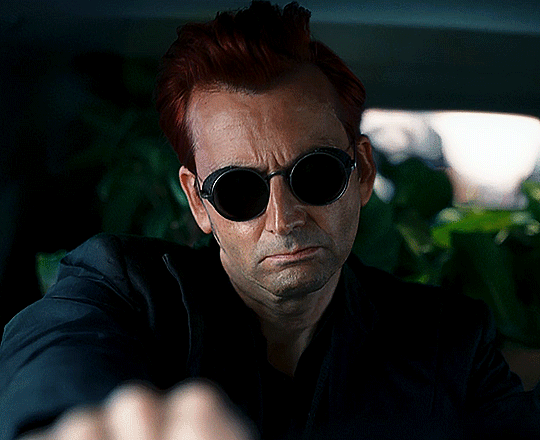
Disclaimer: I have no idea about what is going to happen in Good Omens. This analysis could clearly be considered a theory since I'm not Neil Gaiman, but as someone who knows about narrative and character structure, I'm going to elaborate. Also, English is not my first language, so sorry in advance.
I've already talked about Aziraphale's possible transformation arc in the Good Omens story. In here I've also written important definitions such as what's a transformation arc. I highly recommend it to read it first.
Now it's time to talk about Crowley.
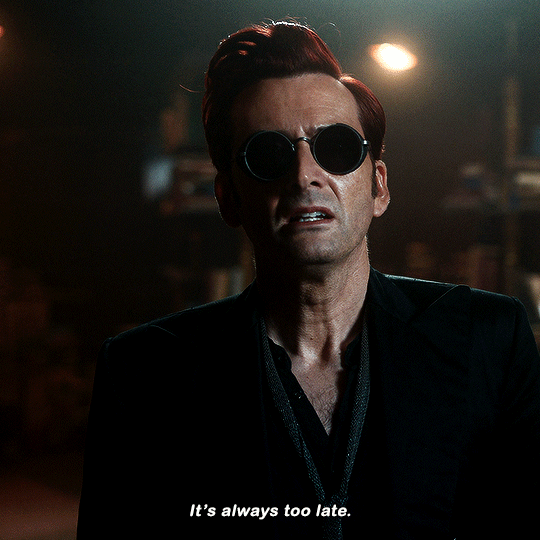
Crowley, the co-protagonist and love interest.
In our role as audience, Crowley is the character with whom one tends to empathize the quickest. By the end of the second season, most would be tempted to think Crowley was right. However, this is a lie. Not only is Crowley not right, but he rejected Aziraphale just the same, choosing his principles over love.
Now, why in the first instance do we not see it that way? Well, because we have Aziraphale's point of view. We always get the angel's reaction first, we always see the way Crowley shows up again and again and again to rescue him unconditionally.
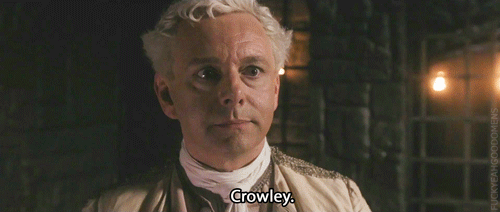
Very rarely do we have a moment where Crowley is alone in crisis because his beliefs are challenged. No, everything he does is in function of Aziraphale and we see the story from his perspective, that is, from the perspective of someone who is in love with Crowley. Because of this, Crowley is equally liked and attractive to everyone equally: we are inside Aziraphale's in love POV.
By the time Crowley proposes Aziraphale to run away together, we as the audience are seeing a proposal that is incredibly tempting to us: we want Aziraphale to accept it because it's what Aziraphale really wants. That's why the fight hurts so much, because we know internally that the two of them had the chance to be together but didn't because they're not ready yet.
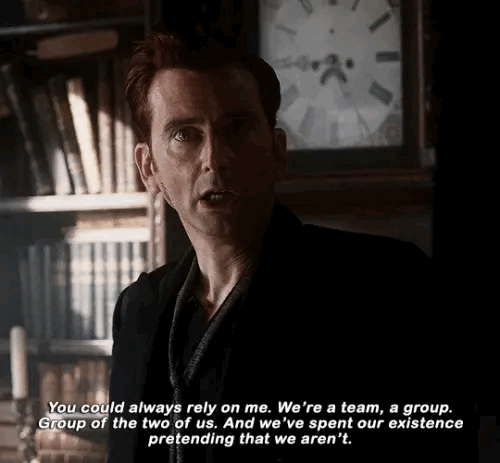
Crowley's Objective
Crowley, unlike Aziraphale, was happy in Season 2 with his current situation. Having cut ties with both Heaven and Hell pleased him, because Crowley always sought only one goal throughout his entire life: freedom.
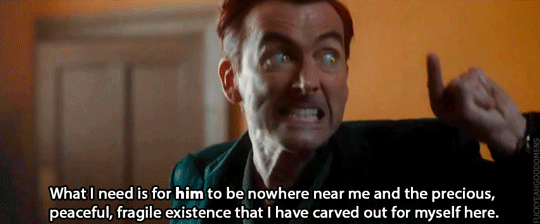
The one thing Crowley has always desired is to be himself with no excuses and no strings attached.
Since before the beginning of time, Crowley came to the conclusion that he didn't fit in Heaven. He thought he would fit in Hell, but soon realized that it was like a deteriorated version of Heaven, so he didn't fit in there either. On Earth he doesn't quite fit in either. Sure, he likes humans, has a certain admiration and curiosity for them, but he still considers them a species far different from his own. He is not human and never will be, so he can't really identify with them at all. He enjoys the advantages of humanity, but he is not one of them.
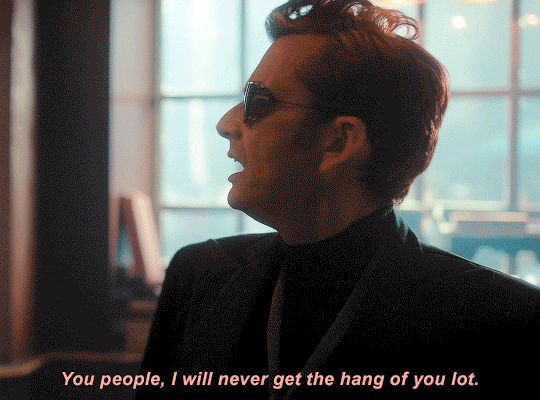
The Job episode is an indicator of this, he himself says so "I am a demon who goes along with Hell as far as I can".
In this same episode, however, the major problem he has with this is also expressed. Azira tells him "that sounds lonely". The counterpart of freedom is loneliness. To be truly free, you need to have nothing and nothing to bind you. That's why Crowley is someone who is unsympathetic and even disinterested in dealing with third parties. He does not remember faces or names, he does not get significantly close to anyone because that would compromise his desire for genuine independence.
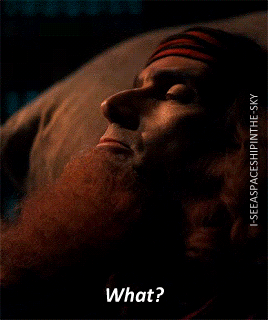
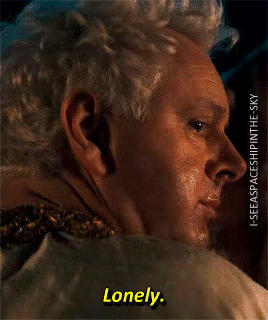
This characteristic is the only one that is present in absolutely all versions of Crowley: the book, radio drama and even in the cursed script of the movie that never was. That's why whenever he sees danger, his first reaction is to run away.
Being free he has nothing to lose… or does he?
Crowley's dilemma
Well, Crowley never fit in by being different and so he always felt somewhat an outcast. However, it wasn't long before he noticed that Aziraphale was also different.
Clearly the angel was not like the other angels in Heaven: he enjoyed Earth, he fell into temptations, he lied to other angels. Also, it is obvious that he would not fit in Hell, and while he is more empathetic to humans, he is still innocently aloof. Aziraphale has a pure goodness that Crowley admires, the goodness that made him be kind to the demon in the first place.
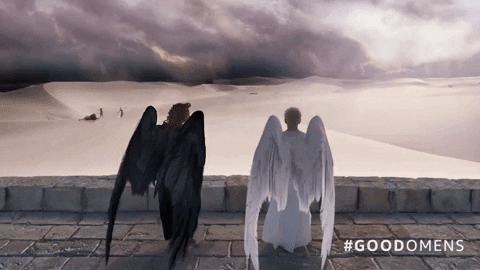
Moreover, no matter the time, no matter how little they knew each other, Aziraphale could always see through Crowley's evil masquerade. The demon could burn goats and murder people, and yet Aziraphale has always held a blind faith towards him. Crowley, the Serpent of Eden, who had been his entire existence told that he's doomed to be a crawling tempter, finds in the angel an unexpected possible friend who's never been afraid or bothered by him.
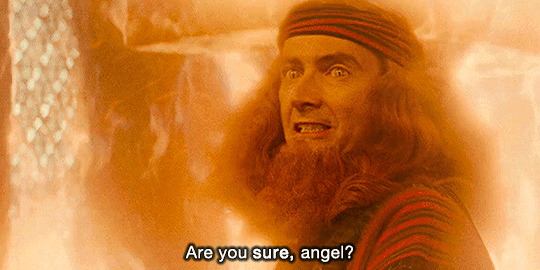
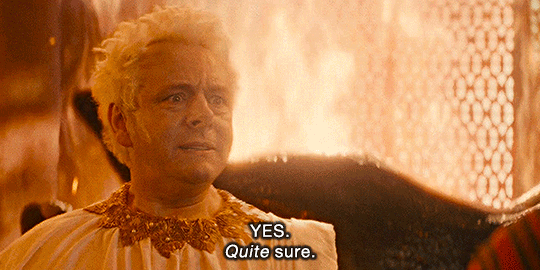
Crowley eventually feels they are both the same: two supernatural entities left on Earth who learned to enjoy life on their own terms. Crowley sees in Aziraphale the companionship he never thought he'd find, the friend he thought at the moment he fell he'd never have. And that feeling of companionship and admiration slowly morphed into something more until it became love.
The season finale isn't the first time Crowley has considered leaving Earth. Probably not even his fight in Season 1 was the first time he considered it. Yet he never did. He never could because, without Aziraphale, running away would doom him to a life of solitude. Free, sure, but completely alone since no one except his angelic friend could understand him.
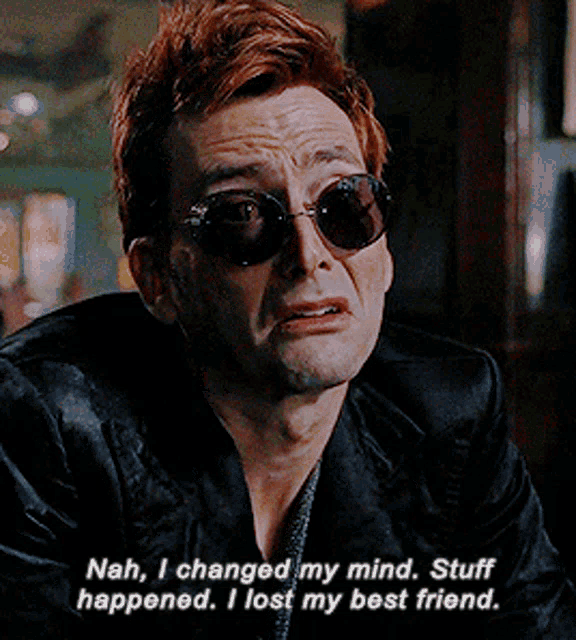
However, I think Crowley is not aware of what he feels. Or at least, he hasn't been for a long time. I'm sure his moment of introspection about his feelings was when Nina confronted him about it. Up to this point, Crowley considered Aziraphale his best and only friend, obviously. Crowley is loyal to a fault and always thought his relationship with Aziraphale was perfect just the way it was, but suddenly someone put it into words and he realized that yes, that's what he really wants with Aziraphale.
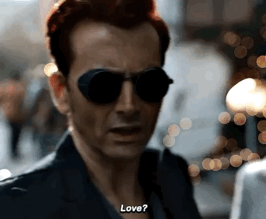
Crowley's decision
Crowley wants his freedom. That's why he never asked Aziraphale for explanations (because at the end of the day they were just friends), that's why he never told him that he was living in his car (because he would end up depending on him), that's why he never talked about his fall (because that would be opening up too much).
The most ironic thing about the whole ending, is that just like Crowley did with Aziraphale… Aziraphale proposed to Crowley the one thing he wants more than anything: to be together, for good, but sacrificing his freedom.
Crowley is capable of doing anything for his angel, even without acknowledging that what they had was love. He's capable of driving on fire, capable of killing Gabriel, capable of walking inside a church. Of everything except one thing.
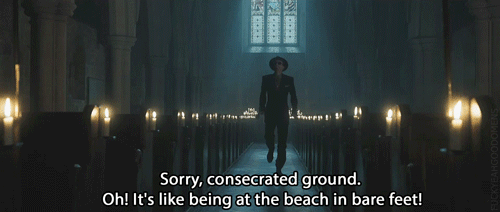
It's the one step Crowley didn't dare take. He is not a martyr like the angel, no, he is not willing to sacrifice himself to be together. So, the obvious happened: Crowley chose his freedom over Aziraphale just as Aziraphale chose Heaven over Crowley.
The end of his arc and Aziraphale.
As I said before, I don't think Crowley will have a significant change comparable to Aziraphale's. His personality and beliefs will not be changed in a momentous way, as Crowley no longer has ties to Heaven or Hell by pulling the tab on both sides.
His side is already picked: Humanity.
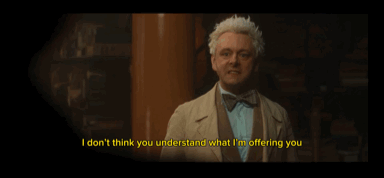
His biggest change is likely to be one of purpose. Crowley is no longer going to be satisfied with his freedom. And the latter is a fact: Crowley is officially free. Without Aziraphale in the equation, he no longer has anything or anyone tying him to do anything or be any other than who he truly is. Crowley can go to Alpha Centauri and never come back; he can sleep for 3,000 years; he can go around the world in the Bentley. He can do whatever he wants. This might seem ideal to the Crowley of 300 years ago, but today's Crowley is completely consumed by loneliness.
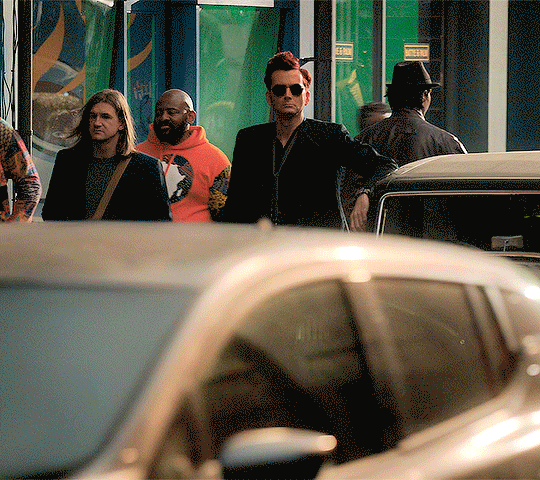
Crowley never cared about building a home or having material things because he never wanted to be tied to anything earthly for the sake of doubt. He was always aware of the destruction of the Earth.
Love is not something that can be prevented though, and in the absence of having a home, he found it in Aziraphale.
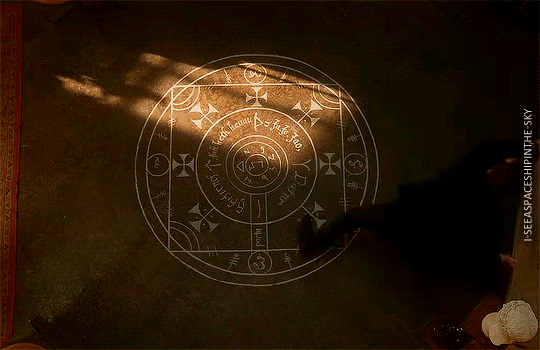
Aziraphale: trustworthy, sweet, warm, funny, a bit of bastard but always irrevocably good. Everything Crowley lost when he fell he almost automatically found back.
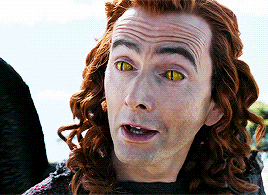
To this day I wonder what Crowley is going to do now that his angel is gone and the possibility of him fleeing to the stars is becoming more and more possible. It's going to depend a lot on how much time passes between seasons, but I don't think it will be much. For not only he was his anchor, no, without Aziraphale, he doesn't have someone to cause him to want to do better, he doesn't have someone to be vulnerable with, he doesn't have a goal anymore, nobody else to impress.
He isn't evil. He isn't good. And now, he is alone.
First Crowley lost the love of God and now the love of Aziraphale. And it is then that Crowley will realize that what he really wants is not to be free, but to be loved. And this desire can only be fulfilled by the love of his life, Aziraphale.
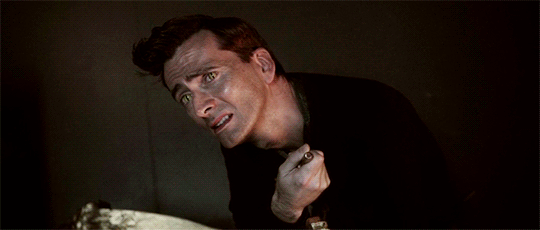
The thing is... Crowley has always wondered why.
Why falling? Why becoming the cursed Serpent? Why could he never be truly free?
At the end of his arc, he must come to the conclusion that the answer was always in front of him:
Love is the only answer he needs.

#why? Love#good omens#crowley#good omens meta#good omens theory#neil gaiman#terry pratchett#good omens crowley#ineffable husbands#aziracrow#character analysis#give me season 3 or give me death#good omens season 2#amazon prime#freedom#demon
279 notes
·
View notes
Text
Everything You Ever Wanted to Know About The Crow Road, But Couldn't Get Through it To Find Out
Co-written by dbacklot and cheeseplants
WARNING: SPOILERS EVERYWHERE!!
Overall Premise: Books are clearly important to Good Omens and Neil & team have left us Clues. In S2E2, the xray trivia highlights a list of books they would like the audience to read. But even more specifically, there are names of certain books on the back of the chairs in the theater in the opening credits. Those books are: The Tale of Two Cities, Pride & Prejudice, and The Crow Road - twice!
What might this mean? One theory is that the chairs represent the seasons. The body swap in S1 is similar to how Carton, in Tale of Two Cities, takes his doppleganger's place in jail, sacrificing his life so Darnay could go free and be with his family.
Pride & Prejudice is clearly referenced in S2, with Crowley's proposal as a sort of mirror to Darcy's first proposal. (There's probably a whole lot more to unpack there - and if you like Austen, here are some thoughts about Aziraphale's favorite book, Persuasion, and how it may relate to the characters.)
BACK to The Crow Road. The title is shown on two chairs in the opening sequence, suggesting that it is related to both S2 and S3. Furthermore, we see the book multiple times in the show and it's the book Muriel reads at the end. As an aside, Neil Gaiman and Iain Banks were very good friends. Iain Banks died over a decade ago, so it is also likely a bit of a tribute to his friend.
So let's dig in and see why perhaps Neil keeps holding this book up and shouting Clue!
Side note: The book is long and most of the action happens in the final third, which can make it a hard read for folks. There's also a lot of characters and it can be tricky to remember how they are all related. There is a family tree BUT it has spoilers.
The Name: The Crow Road is a phrase used by the grandmother to indicate someone has died, ie - he's gone the crow road.
The Plot: This is the story of Prentice growing up with his immediate and extended family in Scotland. His Uncle Rory disappears in his early childhood. Some family members choose to believe Rory is still alive. After a hook-up with his Uncle Rory's former girlfriend as a young adult, Prentice starts gathering journals and writings from his missing Uncle Rory, who was (for a few years) a successful writer and traveler. Prentice eventually learns that 1) another Uncle, Fergus, had murdered his own wife and covered it up as a car accident and 2) Rory had figured this out and confronted him. Fergus then murdered Rory, hid all the evidence, and hired an acquaintance (who also traveled) to send matchboxes from bars across the world to Prentice's father, Kenneth. Kenneth, believed - as Fergus intended - that these were messages from Rory, indicating he was still alive.
Stylistically, Prentice's childhood memories and fragments from Rory's journals are interspersed throughout the book, much like the minisodes are in S2. It can take the reader a while to figure out who is telling the story or where this information is coming from. It is also unclear how reliable Rory is as narrator - perhaps this also plays into S2.
What it Might Mean:
Fergus could represent the Metatron. He is very powerful, rich, and conservative; he lives in a castle (Heaven?) and wants authority. Fergus also murders two relatives and hides those murders; the murder of his wife may have been inspired by jealousy over her sleeping with another man, an event which may or may not have happened.
Fergus also sets up fake messages!! The matchbooks are red herrings to make it look like Rory is still alive. As the Metatron relays messages from God, I can't get over the possibilities here. We have seen God speaking directly as recently as Job, but are the other messages real?
I can't help but wonder if the matchbooks and their use as messages inspired Neil to use the matchbook in S2. The matchbook in S2, incidentally, connects to all three minisodes - the quote from Job, 41:19 (reversed 1941), and the matchbox is from the Resurrectionists pub. So the matchbook contains not only Gabriel’s memories but refers to Azi’s as well?
Much of the book is about this missing uncle. Is a character (or their memory) missing in S3? I have theories, but its too soon to tell.
There's also an interesting theme of Prentice collecting his Uncle Rory's writings and records, including sending some corrupted computer discs to an expert in America to try to restore them. Given the emphasis on records ("It contains information in a tuneful way") and journals in S2, not to mention this trivia nugget - my brain is itching that there's a connection there.
Faith & Beliefs: The book talks about Faith a lot. Prentice believes in God and his father Kenneth doesn’t. And Kenneth doesn’t just reject religion, he wants his children to reject religion too. Prentice on the other hand desperately wants something to believe in - especially after a friend's death in an accident. This leads to a huge fall out - they end up not talking over it.
"'I mean, what's the big argument? Can't you just agree to disagree?'
'No; we disagree about that,' I shook my head. 'Seriously; it doesnt' work that way; neither of us can leave it alone. There's almost nothing either of us can say that can't be taken the wrong way, with a bit of imagination. It's like being married.'" (Ch 7)
Kennth seemingly taunts God - he climbs a church during a lightning storm and is struck dead. His uncle Hamish (one of Kenneth’s brothers) also represents the extreme version of Faith and ends up running a sort of cult, at least until Kenneth’s death.
What it Might Mean: The thread they pull through a lot is about meaning, and whether you can have meaning in life without God. Prentice gains Faith because his friend died senselessly; he wonders how can you have a world be so cruel. There must be a reason for it (this is sort of Az coded), and he turns to God to create the meaning for him.
BUT Kenneth’s argument is that you don’t need Faith for the world to have meaning (or at least that is my reading). It is wonderful because it is inherently meaningless (this is very existentialist, but I do think that’s the point). That Faith doesn’t do that, and just means you are looking outwards without looking at what is right in front of you. Which again, could be a Crowley way of looking at it, or at least where he is headed. Life is good as life, and doesn’t need God to make it so.
Hamish represents someone putting so much meaning into Faith that they lose all sense of Joy, he becomes distant. (One of my favorite scenes is Hamish doing a jigsaw puzzle with the pieces upside down - and cutting the pieces with scissors if they don’t fit right!)
The Romantic Relationships: Prentice is infatuated with a cousin (second cousin?), Verity. She is described as beautiful, in white/light colors, pure, lives with Uncle Fergus in the castle. There are legends around her birth - she was conceived under a tree during a storm. She is unattainable and eventually ends up with Prentice's older brother.
Ash, on the other hand, is almost literally the girl next door and Prentice’s long-term best friend. Her family is poorer and maybe has some domestic violence issues. She's always there for Prentice - literally a shoulder to cry on, sharing a bottle of whiskey, helping him sober up after said whiskey. There's obvious romantic tension from Ash’s side but she never pushes him and instead guides him along. And the book ends with a romantic resolution that feels very much like the final fifteen - except with a happier ending.
“- and I still didn’t feel I could tell her how I felt about her because she was going away now, and how could I suddenly say I love you when I’d never said it to anybody in my life before? How could I say it now especially, the night before she was due to leave? It would look like I was trying to make her stay, or just get her into bed. It would probably wreck this one precious evening that we did have, and upset her, confuse her, even hurt her, and I didn’t want to do any of that.” (Ch 13)
They finally kiss and spend the night together, both confessing their love. Ash has to leave the next morning to pursue a career opportunity in New York; Prentice is sad that she goes but re-dedicating himself to his studies and working towards a relationship together.
What it Might Mean: To me, Verity is very Heaven-coded and Ash is very Hell-coded. A big part of Prentice's arc (Prentice may represent Azi here) is getting over his blind infatuation with Verity and realizing the value and love he has with Ash. However, they also need to be apart and grow a bit before they can be together.
Other thoughts? Connections? Would love to hear your theories!!
@cheeseplants
#good omens#good omens s2#good omens 2#good omens thoughts#final fifteen#good omens meta#the crow road
110 notes
·
View notes
Text
About the yassification of GO2.
Warning: the following text is highly critical of the second season of Good Omens. If you enjoyed it, I am happy for you, and a non-negligible amount of jealous as well. Please scroll past before I inevitably rain on your fandom parade.
So, I did the thing. I binged the entire second season of what was, up to now, my favorite show ever, in one sitting. And I have a great deal of things to say, but hardly any of them is positive.
Let me start by saying that I don't mind the cliffhanger or the melancholy ending, like at all. In our era of Marvel apologists and the instant gratification culture, it is necessary for media to persevere and add nuance to romantic relationships. That said, what transpired during the six hours leading up to this sort of unearned climax hardly contains anything remotely close to nuance.
Who are these people? I don't mean the new characters, all of them written as cardboard-cut anthropomorphic personifications of stereotypes, yassified to the point of representation losing its purpose and getting in the way of, you know, actual writing. I mean the protagonists themselves, Aziraphale and Crowley, up to now my favorite characters in the entire world and -up to now- tangled in a love story so beautiful I had, for better or for worse, devoted a large part of my creative output on it, making art, songs, and metas on why what those two entities had was as close to perfect as anyone can hope to find for themselves.
These are not the characters I knew. The characters I knew spent hundreds of human lifetimes revolving around each other in a treacherous yet familiar dance- they both knew the love was there, it was comfortable like an armchair that has taken the shape of the body using it for years. They argued the way old couples do, and of course, like all fictional beings that are counterparts of one another, had differences to settle, but what stood in their way wasn't misunderstanding or miscommunication, in was their fear of Heaven and Hell, and their fundamentally different approaches on how to keep each other safe.
What is all this teen angst? This will-they-won't-they silliness that lacks any nuance, thematic coherence, or literally even trace amounts of understanding of the source material? Where is the dark humor, the quotability, the chaotic overarching plot, the self conscious camp? The season is so cynically written to cater specifically to a certain part of fandom, that I am losing respect for the original work- because if Neil Gaiman doesn't care for these fictional beings, and he evidently doesn't, why should I?
The thematic core of what made Good Omens what it was, had always been the "Love in unexpected places" trope Sir Terry Pratchett knew how to write so well. It had never been about the fantasy, because Sir Terry wrote satire wrapped up in a supernatural package, it had never been about the romance, because when the ship becomes the end instead of the means, the love rings hollow, like artificial light trying to pass as sunshine. The beating heart of GO lies in its philosophy, in the beautiful notion that the agents of two oppressive systems at war have more in common with one another than with their respective oppressors. That being a nobody, a mere cog in a larger machine, says more about said machine than it does about you, and that you can try to break free and build a life for yourself, where a happy ending looks like a dinner at the Ritz with the one you love most.
Shoehorning an underdeveloped "romance" between Beelzebub and Gabriel not only feels like bad fanfic (disclaimer: I like the ship and feel like it could have worked if developed in any capacity, and presented in a more humorous and character-appropriate way. I hate with passion how much they watered down Beelzebub in order to make them stereotypically romanceable, adding the Ineffable Bureaucracy to the ever-expanding list of characters I don't care about anymore.) but also, it muddles and grossly undermines the thematic raison d'être of Ineffable Husbands. If the ramifications for defecting and fucking off with the enemy were a slap on the wrist for the respective leaders of both sides, well surely the system can't be that oppressive after all. And if fear of the oppressive system wasn't, after all, what kept these beings apart, surely these two entities don't like each other as much as we thought. Or rather, one is reduced to a lovesick puppy and the other to a brainless husk of a character, a plot device, a means to go from place A to place B without spending much brainpower on the logistics.
And if these two new people got to kiss I care not, for they are not the same people I rooted for (props, though, to the actors, who gave, somehow, an almost Shakespearean gravitas to their love affair, underwritten and dumbed down as it was. They both love the characters, and it shows in the minuscule yet brilliant ways in which they added nuance where the script had none.)
What was that thing with the lesbians about? Though straight passing, I have always known myself to be attracted to women as well as men, and I am always highly suspicious when an "ally" writer (see: straight, no shade to straight people among which I live because they are, like, the majority) decides to make all characters queer, in the face of real-world statistics and despite NOT being queer themselves. When a person like Nate Stevenson does it they get a pass because writers self-insert and because, when done well, it can carry a message of equality. But when the ally writer does it, unless it is pitch-perfect, I am forced to examine the possibility of them being calculating about it and trying to score representation points, often because they need the rep as a fig leaf to cry homophobia behind when people start complaining about the atrocious plot.
Nina and Maggie were boring. They had no personalities, no cohesive backstories, nothing to make us understand what they are to one another and to the overarching plot ("plot" is used loosely here, for there was no plot: the series ended where it should have started, with six hours of -progressively more offensive to my intelligence- fanfic tropes in a trenchcoat serving as the, well, "plot"). I didn't care whether or not they'd end up together, because I have no idea who they are. The blandness of the dialogue had the actresses, both very talented as evidenced in the first season, grasping at straws with what little characterization they were left to work with, and the "ball" was so unbelievably bad a plot device no amount of suspension of disbelief was ever going to make it right.
The minisodes, though at parts clever and philosophical, felt out of place. This was another narrative choice I had to raise my eyebrows at, because it felt like a bunch of executives sat around a table and watched Neil Gaiman's powerpoint presentation of what made Season 1 financially successful. They were shoehorned in, largely irrelevant to the, eh, "plot", and most of them lasted far more than I personally deemed welcome, or necessary.
What else is there to say? The wink-winks and nudge-nudges to the Tumblr nation? The in-your-face Doctor Who reference? The narratively myopic choice to make Crowley a former archangel? The cheese dialogue, not one bit of which was quotable?
I am distraught. I am grieving an old friend, and a part of my fandom life I cannot, in good faith, return back to after this gross betrayal. I am happy for those who don't see it, because I wish I could love this season past its flaws. However, the writing isn't simply mediocre, it is irrevocably, immeasurably, undescribably bad, so bad I am shocked to my very core, so bad I find it offensive to Sir Terry's memory and everything his own creative output was lovingly filled with.
I am passing all five stages of grief and very much doubt I will return to this fandom. I loved the original story and the characters with all my heart- now the aforementioned heart is broken, not by the breakup or anything as pedestrian as cheap romantic tropes. But because my old friends, my family of fictional beings, are no longer the ones I loved and could relate to.
Deppie out.
#good omens#good omens season 2#go2#good omens 2 spoilers#gos2 spoilers#good omens s2#aziraphale#crowley#ineffable husbands#good omens critical#good omens season 2 critical#neil gaiman#terry pratchett#good omens spoilers#michael sheen#david tennant
328 notes
·
View notes
Text
Note: Good Omens is by both Terry Pratchett and Neil Gaiman, it just doesn't fit in the character limit lol
The Night Circus by Erin Morgenstern (2011)
The circus arrives without warning. No announcement precedes it, no paper notices plastered on lampposts and billboards. It is simply there, when yesterday it was not.
Within these nocturnal black-and-white-striped tents awaits an utterly unquie experience, a feast did the senses, where no one can be lost in a maze of clouds, meander through a lush garden muse of ice, stare in wonderment as the tattooed contortionist folds herself into a small glass box, and become deliciously tipsy from the scents of caramel and cinnamon that waft through the air.
Welcome to Le Cirque des Rêvez.
Beyond the smoke and mirrors, however, a fierce competition is under way—a contest between two young illusionists, Celia and Marco, who have been trained since childhood to compete in a “game” to which they have been irrevocably bound by their mercurial masters. Unbeknownst to the players, this is a game in which only one can be left standing, and the circus is but the stage for a remarkable battles of imagination and will.
As the circus travels around the world, the feats of magic gain fantastical new heights with every stop. The game is well under way and the lives of all those involved—the eccentric circus owner, the elusive contortionist, the mystical fortune-teller, and a pair of red-haired twins born backstage among them—are swept up in a wake of spells and charms.
But when Celia discovers Marco is her adversary, they begin to think of the game not as a competition but as a wonderful collaboration. With no knowledge of how the game must end, they innocently tumble headfirst into love. A deep, passionate, and magical love that makes the light flicker and the room grow warm whenever they so much as brush hands.
Their masters still pull the strings, however, and this unforeseen occurrence forces them to intervene with dangerous consequences, leaving the lives of everyone from the performers to the patrons hanging in the balance.
The Kingkiller Chronicles by Patrick Rothfuss (2007-present)
My name is Kvothe.
I have stolen princesses back from sleeping barrow kings. I burned down the town of Trebon. I have spent the night with Felurian and left with both my sanity and my life. I was expelled from the University at a younger age than most people are allowed in. I tread paths by moonlight that others fear to speak of during day. I have talked to Gods, loved women, and written songs that make the minstrels weep.
You may have heard of me.
So begins a tale unequaled in fantasy literature--the story of a hero told in his own voice. It is a tale of sorrow, a tale of survival, a tale of one man's search for meaning in his universe, and how that search, and the indomitable will that drove it, gave birth to a legend.
Six of Crows by Leigh Bardugo (2015-2016)
Ketterdam: a bustling hub of international trade where anything can be had for the right price—and no one knows that better than criminal prodigy Kaz Brekker. Kaz is offered a chance at a deadly heist that could make him rich beyond his wildest dreams. But he can’t pull it off alone. . . .
A convict with a thirst for revenge
A sharpshooter who can’t walk away from a wager
A runaway with a privileged past
A spy known as the Wraith
A Heartrender using her magic to survive the slums
A thief with a gift for unlikely escapes
Kaz’s crew is the only thing that might stand between the world and destruction—if they don’t kill each other first.
American Gods by Neil Gaiman (2001)
Days before his release from prison, Shadow's wife, Laura, dies in a mysterious car crash. Numbly, he makes his way back home. On the plane, he encounters the enigmatic Mr Wednesday, who claims to be a refugee from a distant war, a former god and the king of America.
Together they embark on a profoundly strange journey across the heart of the USA, whilst all around them a storm of preternatural and epic proportions threatens to break.
Scary, gripping and deeply unsettling, American Gods takes a long, hard look into the soul of America. You'll be surprised by what - and who - it finds there...
The Lunar Chronicles by Marissa Meyer (2012-2015)
Humans and androids crowd the raucous streets of New Beijing. A deadly plague ravages the population. From space, a ruthless lunar people watch, waiting to make their move. No one knows that Earth's fate hinges on one girl. . . .
Cinder, a gifted mechanic, is a cyborg. She's a second-class citizen with a mysterious past, reviled by her stepmother and blamed for her stepsister's illness. But when her life becomes intertwined with the handsome Prince Kai's, she suddenly finds herself at the center of an intergalactic struggle, and a forbidden attraction. Caught between duty and freedom, loyalty and betrayal, she must uncover secrets about her past in order to protect her world's future.
The Princess Bride by William Goldman (1973)
Westley ... handsome farm boy who risks death and much, much worse for the woman he loves; Inigo ... the Spanish swordsman who lives only to avenge his father's death; Fezzik ... the Turk, the gentlest giant ever to have uprooted a tree with his bare hands; Vizzini ... the evil Sicilian, with a mind so keen he's foiled by his own perfect logic; Prince Humperdinck ... the eviler ruler of Guilder, who has an equally insatiable thirst for war and the beauteous Buttercup; Count Rugen ... the evilest man of all, who thrives on the excruciating pain of others; Miracle Max ... the King's ex-Miracle Man, who can raise the dead (kind of); The Dread Pirate Roberts ... supreme looter and plunderer of the high seas; and, of course, Buttercup ... the princess bride, the most perfect, beautiful woman in the history of the world.
S. Morgenstern's timeless tale--discovered and wonderfully abridged by William Goldman--pits country against country, good against evil, love against hate. From the Cliffs of Insanity through the Fire Swamp and down into the Zoo of Death, this incredible journey and brilliant tale is peppered with strange beasties both monstrous and gentle, and memorable surprises both terrible and sublime.
Charlie and the Chocolate Factory by Roald Dahl (1964)
Willy Wonka's famous chocolate factory is opening at last!
But only five lucky children will be allowed inside. And the winners are: Augustus Gloop, an enormously fat boy whose hobby is eating; Veruca Salt, a spoiled-rotten brat whose parents are wrapped around her little finger; Violet Beauregarde, a dim-witted gum-chewer with the fastest jaws around; Mike Teavee, a toy pistol-toting gangster-in-training who is obsessed with television; and Charlie Bucket, Our Hero, a boy who is honest and kind, brave and true, and good and ready for the wildest time of his life!
The Infernal Devices by Cassandra Clare (2010-2013)
Magic is dangerous--but love is more dangerous still.
When sixteen-year-old Tessa Gray crosses the ocean to find her brother, her destination is England, the time is the reign of Queen Victoria, and something terrifying is waiting for her in London's Downworld, where vampires, warlocks and other supernatural folk stalk the gaslit streets. Only the Shadowhunters, warriors dedicated to ridding the world of demons, keep order amidst the chaos.
Kidnapped by the mysterious Dark Sisters, members of a secret organization called The Pandemonium Club, Tessa soon learns that she herself is a Downworlder with a rare ability: the power to transform, at will, into another person. What's more, the Magister, the shadowy figure who runs the Club, will stop at nothing to claim Tessa's power for his own.
Friendless and hunted, Tessa takes refuge with the Shadowhunters of the London Institute, who swear to find her brother if she will use her power to help them. She soon finds herself fascinated by--and torn between--two best friends: James, whose fragile beauty hides a deadly secret, and blue-eyed Will, whose caustic wit and volatile moods keep everyone in his life at arm's length . . . everyone, that is, but Tessa. As their search draws them deep into the heart of an arcane plot that threatens to destroy the Shadowhunters, Tessa realizes that she may need to choose between saving her brother and helping her new friends save the world. . . . and that love may be the most dangerous magic of all.
Good Omens: The Nice and Accurate Prophecies of Agnes Nutter, Witch by Terry Pratchett and Neil Gaiman (1990)
The world is preparing to come to an end according to the Divine Plan recorded in the Nice and Accurate Prophecies of Agnes Nutter, Witch (recorded 1655). Meanwhile, a fussy angel and a fast-living demon have grown fond of living among the earth's mortals for many millennia and are not looking forward to the apocalypse. If Crowley and Aziraphale are going to stop it from happening, they must find and kill the Antichrist.
Coraline by Neil Gaiman (2002)
In Coraline's family's new flat there's a locked door. On the other side is a brick wall—until Coraline unlocks the door . . . and finds a passage to another flat in another house just like her own. Only different.
The food is better there. Books have pictures that writhe and crawl and shimmer. And there's another mother and father there who want Coraline to be their little girl. They want to change her and keep her with them. . . . Forever.
#best fantasy book#poll#the night circus#the kingkiller chronicles#six of crows#american gods#the lunar chronicles#the princess bride#charlie and the chocolate factory#the infernal devices#good omens#coraline
75 notes
·
View notes